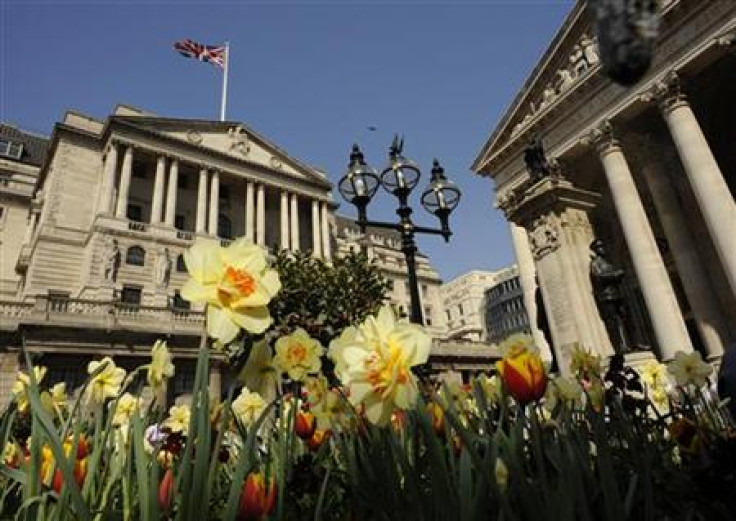Bank of England keeps interest rates on hold despite last month's split

The Bank of England has decided to keep interest rates on hold for a fourteenth consecutive month despite a split in last month's decision to hold it at 0.5 pct.
The decision to hold rates comes at a time when the Bank has warned of rising interest rates affecting homeowners who are at risk of repossession in its bi-annual 'Financial Stability' report.
Minutes for today's meeting will be available 21 July.
This month's decision to hold it at 0.5 pct was widely expected, though a 7-1 vote last month - no longer unanimous - means that focus will remain on this meeting until minutes from it are released.
The Bank which also releases a monthly Inflation Report, had expressed confidence in the recovery to halt inflation, however Sentence, a well-known 'hawk' on the Monetary Policy Committtee had voted to raise interest rates at a time when there appeared no need for it.
Sentence's reasoning was that it was necessary 'to withdraw support from the economy' whilst also keeping the pressure down on inflation.
However, following his decision, the rise in VAT introduced by the Government is something that manufacturers are placing emphasis on:
"The planned VAT rise will place additional pressure on already elevated inflation expectations and next month's Inflation Report will need to consider the risks of relying on spare capacity in the economy to bring down inflation and expectations," said the EEF - manufacturing body's chief economist Lee Hopley.
The resulting atmosphere leaves the Bank with pressure from both sides to both keep inflation in check, whilst avoiding a recession and potential effect of interest rate hikes on households.
The delaying of the rise in VAT till January is part of the reasoning for this - to allow time for the Bank to reduce inflation caused by Quantitative Easing.
David Miles, a British Economist on the MPC meanwhile admitted last week that he felt inflation was 'uncomfortably high' and needed reducing.
A well-known 'dove' on the MPC, David Miles added:
"We now know we have had a fairly significant period - at least a couple of quarters - of reasonable growth, and the business surveys suggest that is probably going to continue,"
"My own assessment of the most likely outcome is actually growth in the economy continues and perhaps picks up a bit from here, and inflation moves back towards the target level."
Adam Posen, meanwhile, an American member on the MPC adds that whilst upcoming VAT rises and austerity measures were giving him 'sleepless nights' he still agreed that the measures were necessary to avoid borrowing:
"For the UK specifically... there may simply be no choice - the structural budget deficit is now too large, the state share of the economy has become too high, and the risk of savings leaving our markets remains very small but still too great."
"The UK economy is potentially switching between two states - a recovery, which we are now in, albeit perhaps an initially weak one... and the renewal of a severe recession if not outright deflation."
ANALYSIS
Howard Archer, an economist with financial analysts IHS Global Insight believes the recovery requires low interest rates to succeed.
A leading economist with Standard & Poor before IHS Global, Howard believes that interest rate rises are unlikely due to this 'fragile' nature which Posen pointed out that could be triggered into a recession again if rates are increased too quickly.
"We still believe that the Bank of England will keep interest rates down at 0.5% through 2010," he said, "Due to the economic recovery likely remaining bumpy and gradual,"
"While the MPC was clearly expecting significant extra fiscal tightening to be announced, we believe that the scale of the measures set out will be sufficient to encourage most MPC members to remain in 'wait and see' mode on inflation and growth and to hold off from raising interest rates in the near term at least," he adds.
Vicky Redwood, a senior economist at Capital Economics - agrees, saying that 'near-term' rate rises are now almost impossible:
"Given that most members still believe that the spare capacity in the economy will bring inflation down, this latest news should give them the confidence to hold on for at least a couple more months to see if their view is proving correct." she says in her note to clients.
"After all, the additional fiscal tightening announced in the Budget will, other things equal, obviously increase the downward pressure on inflation further ahead."
The economists at RBS meanwhile predict a rate rise in November to 1 pct or 0.75 pct earlier on, with a sustained increment depending on how fast and how deep is spending cuts versus GDP.
Related Articles
© Copyright IBTimes 2024. All rights reserved.





